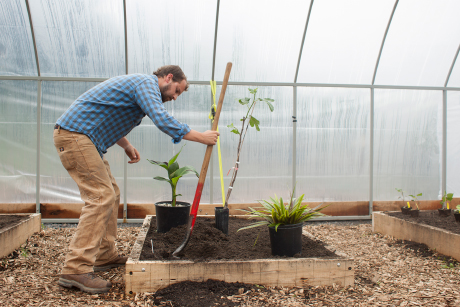
Okra, peanuts, cotton and bananas are not exactly staple crops on Ithaca farms and home gardens. But as the world gets warmer, will there be a place for tropical varieties in New York state? And what will happen to current crops such as lettuce, radish and spinach?
Cornell researchers aim to find out by simulating potential climate change conditions under plastic.
A high tunnel – an unheated greenhouse covered by a single layer of clear polyethylene – is being erected at Cornell Plantations to house a climate change demonstration garden.
The high-temperature, controlled precipitation environment will be used by student and faculty researchers in the Departments of Horticulture and Landscape Architecture to research the effects of changing growing conditions on growth and survival of select plants, and potential adaptive solutions.
It will also be an educational tool for the 50,000 people who visit Plantations’ botanical gardens, arboretum and natural areas each year, said Sonja Skelly, Cornell Plantations director of education.
“It is an ideal location to mount such a demonstration, and we are excited to provide an additional opportunity for students and visitors to explore environmental issues through the lens of the garden,” Skelly said. …
“While the public may perceive the warmer summers and occasional droughts, the practical effect of these and other environmental changes on plants, ecosystems and long-term agricultural productivity is difficult to grasp,” said Chris Wien, professor of horticulture, a principal investigator on the project along with Skelly and Josh Cerra, assistant professor of landscape architecture.
Read the whole article. [Cornell Chronicle 2014-05-29]


